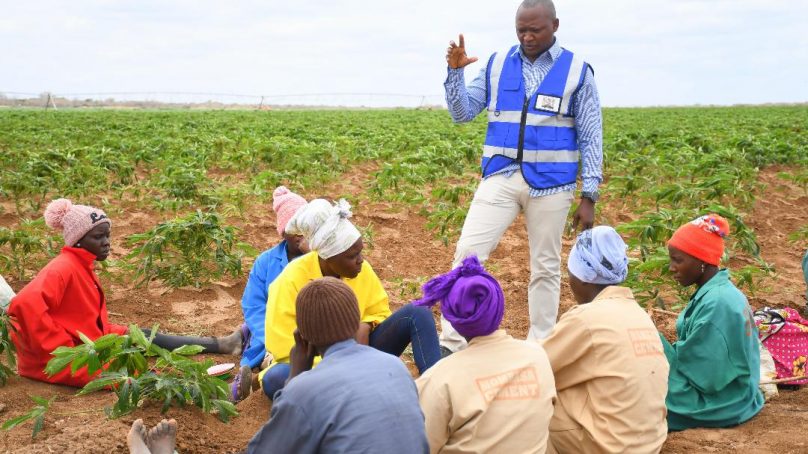
Galana-Kulalu irrigation scheme is taking shape as private investors and government agencies push forward with plans to put thousands of acres under crop to strengthen Kenya’s food security.
Kishor Patel of Nyumba Group Manager said the project is already cultivating cassava, onions and maize using pivot irrigation systems. Currently, nine pivots are in operation out of 23 that have been installed. Each pivot irrigates 120 acres.
“We now have about 200 acres of onions, 500 to 600 acres of maize and a similar acreage of cassava. Once all 23 pivots are operational by early next year, we will have about 3,000 acres under irrigation,” Patel explained.
He added that the long term goal is to expand to between 4,000 and 5,000 acres of cassava, 10,000 acres of maize, and up to 15,000 acres of onions.
Patel, however, cited several challenges, including destruction of crops by wild animals such as elephants, zebras and hippos, reliance on expensive generator power due to lack of a Kenya Power connection, water contamination from upstream activities and poor road infrastructure.
“Kenya has a good climate and a lot of land. The government and the people should encourage agribusiness, because it can create jobs and strengthen the economy,” he said.
At the same time, Selu Africa Limited, the company leading the commercialisation of the scheme under a public-private partnership, is ramping up production on 20,000 acres. CEO Nicholas Ambanya said the firm has already planted maize on 1,500 acres and will begin harvesting in the coming week.
The acreage will increase to 3,200 acres by the end of the year, 5,400 acres by mid-next year, and eventually the full 20,000 acres.
“This project has already created 500 jobs. At full-scale, we expect to have at least 2,000 people directly employed,” Ambanya said.
Although maize is the primary crop, Selu Africa plans to diversify into groundnuts, sunflower, chia seeds, mangoes, green peas and other crops to maximize productivity.
Ambanya said the government has played a critical role in providing irrigation water, constructing a bridge across the Galana River and planning for electricity connection. Discussions are also ongoing to designate the project as a Special Economic Zone.
Addressing concerns about proximity to Tsavo National Park, Ambanya noted that a conservancy buffer, a 33-kilometer electric fence, and trenches are keeping wild animals out of the farms. Workers are also trained to coexist with wildlife.
Beyond agriculture, the company has pledged to work with local communities to improve water supply, sanitation, health, education, and environmental conservation.
“This project is not just about farming. It is about transforming lives and building food security for Kenya,” he said.
Irrigation Secretary Joel Tanui said the government places priority has always remained food security, with the State Department for Irrigation prioritizing irrigation development in the country to breach the food deficit.
“We have a clear plan as a government through the National Irrigation Sector Investment Plan on what we need to do in the next 10 years to ensure that there will be zero food import in the country,” said Tanui.
Under the National Irrigation Sector Investment Plan, there are two clear pathways used to breach food security.
One of them is to open the arid and semi-arid areas (ASAL) which hold 80 to 90 per cent of potential arable land in Kenya and the government is now revitalising and opening it up for irrigation development.
The other pathway they are having as a target investment by government is on corporate agribusiness where the public private partnership comes in place.
“So we are having a one government approach under the land commercialisation initiative to bring on board all idle land within the country into agricultural production,” Tanui said.
“For us to do this, we have been able to map a large scale of community land, which traditionally was being held as ranches, and we also have government institutions who have been holding large parcels of land for many years without any substantive production activities in those land,” he added.
He noted that through a multi-agency approach, there are different government institutions supporting the project which include; the ministry of Agriculture, Kenya Wildlife Service, who are helping the private investors with the wild animals, Rural Electrification and Renewable Energy Corporation (REREC) which is helping with electricity connection to the farm and Kenya Rural Roads Authority (KERRA) helping with road connectivity to the project.
“So with the multiagency approach by government, we are seeing a very big success in the Galana-Kulalu irrigation Project and we look forward to having increased food production in Kenya,” he said.
He called upon communities who are still holding land, especially communal land in large scale to engage with the government to take up that parcel of land to open it up for production and food security.
One of the beneficiaries of the project Zawadi Wario, who is on her fourth month since she started working on the project expressed gratitude for the initiative by the government and private partners in creating job opportunities for the locals.
Wario was optimistic that the locals will reap big from Galana-kulalu if it’s implemented fully to its potential.
Kassim Mohammed a local resident from the Orma community said the project has helped them as a pastoral community since they now embrace maize farming which comes in handy during the drought season when there is not enough pasture.
Mohammed asked youth who are looking for employment to embrace the opportunities available at Galana-kulalu saying the project has created jobs and enlightened the communities on modern agriculture.
- A Tell Media / KNA report / By Chari Suche
Irrigation Secretary in the State Department for Irrigation Joel Tanui flanked by Ministry officials briefs the media on the side-lines of a tour of the Galana Kulalu Irrigation Project in Kilifi County.
Irrigation Secretary in the State Department for Irrigation Joel Tanui (L) and Nyumba Group manager Kishor Patel during a tour of the Galana Kulalu Irrigation Project in Kilifi County.







